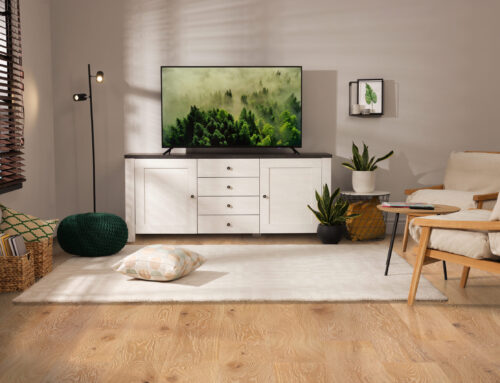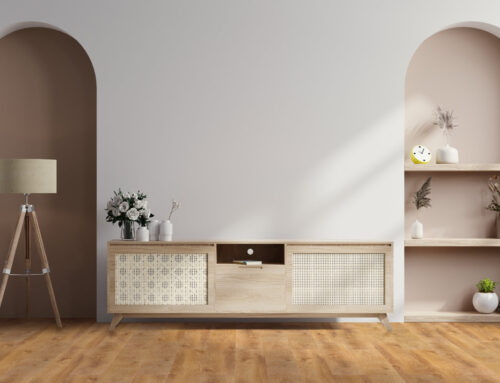No, luxury vinyl flooring is generally not toxic when purchased from reputable manufacturers who follow safety standards. However, lower-quality products may contain harmful substances that could impact indoor air quality and health.
Luxury Vinyl Plank(LVP) flooring has surged in popularity in recent years, thanks to its durability, affordability, and wide range of design options. However, as with any home improvement material, concerns about its safety and toxicity have also emerged. In this comprehensive article, we will delve into the world of luxury vinyl flooring to address these concerns and provide insights on how to ensure a safe and non-toxic environment in your home or business.
What is Luxury Vinyl Flooring?
Luxury Vinyl Flooring, often abbreviated as LVP, is a synthetic flooring material designed to mimic the appearance of natural materials such as hardwood, stone, or tile. It is renowned for its versatility, cost-effectiveness, and ease of maintenance.
How is it made and where?
LVP is typically manufactured using a layered process that involves PVC (polyvinyl chloride) as the core material, a high-resolution photographic layer for design, and a clear wear layer for protection. Most luxury vinyl flooring is produced in various locations around the world, including the United States, China, and Europe, with each manufacturer following specific quality control measures.
What is it made of, and why is it Popular?
Luxury vinyl flooring is primarily composed of vinyl, a synthetic material that is both durable and resilient. It is favored for its affordability compared to natural materials like hardwood or stone. Additionally, LVP offers a vast array of design choices, making it an attractive option for those seeking versatile and stylish flooring solutions.
What is Toxic LVP Flooring?
Toxic LVP flooring refers to vinyl flooring products that contain harmful chemicals that can leach into your home environment. These toxins can be released through various processes, potentially affecting indoor air quality and posing health risks to occupants. Not all LVP is toxic; the quality of manufacturing, materials used, and adherence to safety standards play crucial roles in determining toxicity levels.
What are Volatile Organic Compounds (VOCs)?
Volatile Organic Compounds (VOCs) are chemicals that evaporate at room temperature and can be released into the air from certain products, including some flooring materials. In LVP flooring, VOCs may be present in adhesives, finishes, and the vinyl material itself.
Common VOCs found in lower-quality vinyl flooring include:
- Formaldehyde
- Benzene
- Toluene
- Xylene
- Ethylbenzene
These compounds can contribute to poor indoor air quality and may cause health issues ranging from eye, nose, and throat irritation to headaches, nausea, and in some cases, damage to the liver, kidneys, or central nervous system with long-term exposure.
What is Vinyl Floor Off-Gassing?
Off-gassing refers to the process by which VOCs and other chemicals are released from materials into the air. With vinyl flooring, off-gassing typically occurs when the product is new and gradually decreases over time.
During off-gassing, you might notice a distinct “new flooring smell” in your home. This odor is actually the result of chemicals being released into your indoor air. Higher-quality LVP products tend to have lower VOC content and, consequently, less off-gassing compared to cheaper alternatives.
How Long Do Vinyl Floors Off-Gas?
The off-gassing period for vinyl flooring can vary significantly based on the quality of the product and the specific chemicals used in manufacturing. Generally, the most intensive off-gassing occurs within the first few weeks to months after installation.
- Initial period (1-4 weeks): Highest levels of off-gassing
- Medium-term (1-6 months): Moderate levels that gradually decrease
- Long-term (beyond 6 months): Minimal off-gassing continues, but at significantly reduced levels
Some higher-quality luxury vinyl flooring products may complete most of their off-gassing before even reaching your home, as they undergo curing processes at the factory. Proper ventilation during and after installation can help reduce exposure to these emissions.
What is PVC?
Polyvinyl chloride (PVC) is the primary material used in vinyl flooring production. It’s a synthetic plastic polymer that provides durability, water resistance, and flexibility to the flooring. The core of most luxury vinyl planks consists primarily of PVC.
PVC Health Risks:
While PVC itself is relatively stable once manufactured, there are several health concerns associated with it:
- Phthalates: These chemicals are often added to PVC to increase flexibility. Some phthalates are endocrine disruptors that can interfere with hormone function and have been linked to reproductive issues, developmental problems, and other health concerns.
- Chlorine Content: The production of PVC involves chlorine, which creates dioxins, highly toxic compounds that can cause cancer, reproductive and developmental problems, immune system damage, and hormone disruption.
- Lead and Cadmium: Lower-quality PVC products may contain heavy metals as stabilizers, which can be harmful, especially to children and pregnant women.
- Vinyl Chloride: This precursor to PVC is a known human carcinogen, though exposure is primarily a concern for workers in manufacturing facilities rather than consumers.
It’s important to note that many reputable manufacturers have moved away from harmful additives and now offer phthalate-free LVP products with significantly reduced health risks.
What are 5 LVP Flooring Impacts on Health?
Lower-quality LVP flooring may have following 5 impacts on your health:
- Respiratory Issues: VOCs and other chemicals can trigger asthma attacks, allergic reactions, and other respiratory problems, particularly in sensitive individuals.
- Developmental Concerns: Certain chemicals in some vinyl products, such as phthalates, have been associated with developmental issues in children.
- Skin Irritation: Direct contact with certain chemicals in flooring can cause skin irritation or allergic reactions in some individuals.
- Headaches and Dizziness: Short-term exposure to high levels of VOCs can cause headaches, dizziness, and general discomfort.
- Long-term Exposure Risks: Prolonged exposure to certain chemicals found in lower-quality vinyl flooring has been associated with more serious health conditions, though research is ongoing.
Does Vinyl Flooring Cause Cancer?
The relationship between vinyl flooring and cancer risk is complex and depends on several factors. Some chemicals historically used in vinyl flooring production, such as certain phthalates and vinyl chloride (used in manufacturing), have been classified as possible or known carcinogens.
However, modern, high-quality LVP products from reputable manufacturers typically avoid these problematic chemicals. Current production standards in many countries restrict the use of known carcinogenic compounds in consumer products, including flooring.
What Are 5 Safety Tips Homeowners Can Follow to Minimize Chemical Exposure From Luxury Vinyl Flooring?
To minimize any potential risks associated with LVP flooring, consider these safety tips:
- Choose flooring products with low-VOC or zero-VOC certifications
- Look for phthalate-free options from reputable manufacturers
- Ensure proper ventilation during and after installation
- Follow manufacturer guidelines for installation and maintenance
- Consider professional installation to reduce exposure to adhesives
Hardwood Flooring Vs LVP: Which is More Toxic?
When comparing the toxicity potential of hardwood flooring versus luxury vinyl planks, several factors come into play:
Hardwood Flooring:
- Natural material with minimal processing
- May use adhesives and finishes that contain VOCs
- Water-based finishes offer low-toxicity options
- Sustainably sourced wood is an environmentally friendly choice
- Generally considered less toxic overall, especially with low-VOC finishes
Luxury Vinyl Flooring:
- Synthetic material with more complex manufacturing processes
- Quality varies significantly between manufacturers
- Higher-quality options with proper certifications can have minimal toxicity
- Lower-quality products may contain potentially harmful chemicals
- Generally, more processing and chemical content than natural hardwood
Overall, high-quality hardwood flooring with water-based, low-VOC finishes typically presents fewer toxicity concerns than vinyl options. However, premium LVP products from reputable manufacturers with appropriate certifications can be very safe options as well.
The key difference lies in the baseline material. Wood is natural, while vinyl is synthetic. For the most health-conscious consumers, properly finished hardwood or other natural flooring materials may provide greater peace of mind.
What are the Top Brands To Buy Quality LVP
Not all luxury vinyl flooring brands are created equal. Higher quality brands invest in extensive quality control measures and third-party testing to ensure their products meet safety standards. They often prioritize customer safety and satisfaction over cost-cutting.
Lower quality luxury vinyl flooring manufacturers may cut corners by using subpar materials, leading to potential health hazards. To ensure the safety of your home or business, it is crucial to select brands known for their commitment to quality and safety.
Recommendation
Choosing reputable brands is crucial for ensuring you get non-toxic luxury vinyl flooring. Rustic Floor Wood Supply is known for high-quality, low-VOC products with rigorous testing standards.
Higher Quality Flooring is Not Toxic
It’s important to emphasize that luxury vinyl flooring from reputable brands is not inherently toxic. The materials used, such as PVC, are safely encapsulated, and the finishes are typically water-based, often containing aluminum oxide, a compound that has been used safely for decades.
Why Brand Matters in Ensuring Non-Toxic Luxury Vinyl Flooring:
Higher Quality Brands are Monitored:
Not all luxury vinyl flooring brands are created equal. Higher quality brands invest in extensive quality control measures and third-party testing to ensure their products meet safety standards. They often prioritize customer safety and satisfaction over cost-cutting.
Lower Quality Sacrifices Human Health:
Lower quality luxury vinyl flooring manufacturers may cut corners by using subpar materials, leading to potential health hazards. To ensure the safety of your home or business, it is crucial to select brands known for their commitment to quality and safety.
Recommendations: Urban Floors and Cordalera Floors:
For peace of mind, consider brands like Urban Floors and Cordalera Floors, which are renowned for their commitment to producing high-quality, non-toxic luxury vinyl flooring options. These brands prioritize safety and utilize reliable manufacturing processes.
Higher Quality Flooring is Not Toxic:
It’s important to emphasize that luxury vinyl flooring from reputable brands is not inherently toxic. The materials used, such as PVC, are safely encapsulated, and the finishes are typically water-based, often containing aluminum oxide, a compound that has been used safely for decades.
Why Luxury Vinyl Flooring is Not Toxic in the Home:
Materials are Manufactured in a Factory:
The production of luxury vinyl flooring occurs in a controlled factory environment, minimizing the risk of exposure to harmful substances during installation.
No Off-Gassing in the House:
Unlike some flooring options, luxury vinyl flooring does not emit harmful off-gases in your home. Once installed, the materials remain stable and safe for indoor air quality.
Materials are Mainly Stone and Encapsulated:
Despite the synthetic appearance, many luxury vinyl floors incorporate natural stone as part of their composition, adding to their durability and safety. These materials are securely encapsulated within the flooring layers.
Water-Based, Safe Finish:
The finish applied to luxury vinyl flooring is typically water-based and often contains aluminum oxide. This finish has a long history of safe use and contributes to the flooring’s durability and resistance to wear.
No Known Harmful Products:
Reputable luxury vinyl flooring brands do not use known harmful chemicals such as formaldehyde or phosphates in their manufacturing processes, further ensuring safety.
How to Ensure You Are Buying Non-Toxic Luxury Vinyl Flooring:
Check for Certifications:
Look for certifications from recognized organizations, such as GREENGUARD or FloorScore, which indicate that the flooring product has been tested and meets specific indoor air quality standards.
Contact the Manufacturer:
Don’t hesitate to reach out to the manufacturer or retailer with your questions about the flooring’s safety and composition. Reputable companies will be transparent and provide information to address your concerns.
Research the Brand’s Track Record:
Investigate the brand’s reputation and history. Brands with a strong track record of producing safe and high-quality luxury vinyl flooring are more likely to prioritize customer safety.
What if I am Still Worried About Toxic Flooring?
If you remain concerned about the potential toxicity of flooring materials, consider exploring alternative options, such as hardwood flooring. Hardwood flooring is a natural material with minimal engineered components. Water-based finishes can be used, which are carefully controlled for air quality, ensuring a safe and eco-friendly choice for your home or business.
Luxury vinyl flooring is a popular and versatile choice for modern homes and businesses, and when sourced from reputable brands, it is a safe and non-toxic option. By paying attention to brand reputation, certifications, and manufacturing processes, you can ensure that your luxury vinyl flooring contributes to a healthy and beautiful environment in your living or working space. However, for those who remain concerned about synthetic materials, hardwood flooring offers an eco-friendly and low-toxicity alternative that can meet your flooring needs. Ultimately, the key to safety is informed decision-making and selecting the right materials for your specific requirements.
If you are looking for quality luxury vinyl flooring you can visit our stores in Atlanta, Boise & Spokane for some help on choosing the best flooring option for you and your home.



